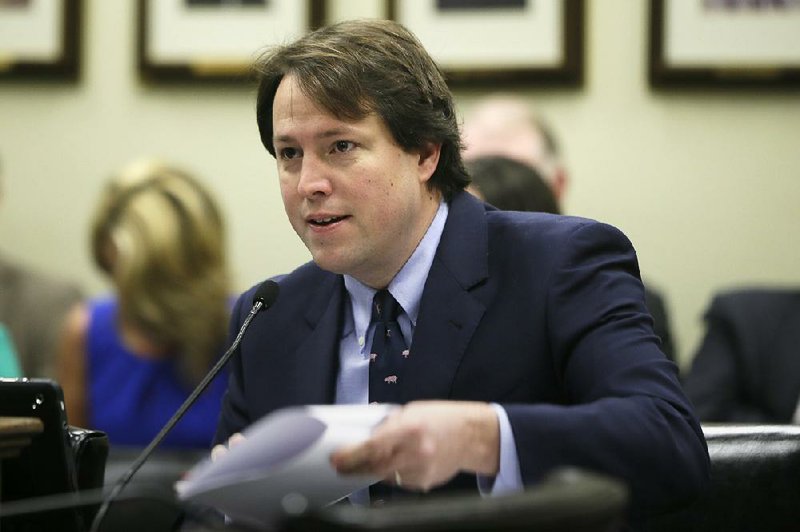Reacting to last year's bribery conviction of an Arkansas judge, a House panel Tuesday backed a proposal to end lawsuit immunity for judges convicted of such impropriety.
While lawmakers on the House Judiciary Committee largely supported a bill dealing with judicial bribes, they expressed reservations about another bill that would increase penalties for public officials -- including legislators -- who receive improper benefits. Committee members requested changes to clarify that campaign contributions could not be construed as bribes.
Both bills were sponsored by Rep. Clarke Tucker of Little Rock, who along with other Democrats, filed a series of bills in November that they said would increase government transparency and improve ethics.
House Bill 1007, approved by the committee Tuesday, would allow litigants adversely affected by a judicial decision that is the result of a bribe to sue the judge for damages. Judicial immunity now protects judges from being held liable for their court decisions.
A judge would have to be convicted or plead guilty to taking a bribe before he could be sued under Tucker's proposal. The exemption from immunity would apply only to the case and litigants adversely affected by the bribe.
While he was not mentioned by name by the committee, former Faulkner County Circuit Judge Michael Maggio, who is appealing his federal bribery conviction, was alluded to several times during the discussion of the bill.
"We know who we are talking about here in the case that is still being litigated," said David Sachar, the director of the Arkansas Judicial Discipline and Disability Commission, who testified in favor of Tucker's proposals.
In his 2015 plea agreement, Maggio admitted that he lowered a Faulkner County Circuit Court jury's $5.2 million judgment to $1 million in July 2013 in exchange for contributions to his since-halted campaign for the Arkansas Court of Appeals. The decision came in a negligence lawsuit filed by the family of Martha Bull, a Perryville woman who died in 2008 in a Greenbrier nursing home.
Bribery convictions in the judiciary are rare, Sachar told the committee. However, Tucker said, his bill could be construed to cover other examples of miscreant judges, including recent cases in Arkansas in which judges were accused of issuing favorable decisions in exchange for sexual favors.
The committee supported HB1007 by a vote of 12-3. One of the dissenters, Rep. Michelle Gray, R-Melbourne, said it was unfair for the Legislature to end immunity for judges while not making themselves subject to similar lawsuits.
"Throw us in there too," Gray said. Tucker said he is open to imposing similar standards on lawmakers, but noted that judges are expected to be impartial and can recuse from a case, and lawmakers aren't held to the same standard.
HB1007 now moves to the House for consideration.
The second of Tucker's proposals to be considered Tuesday, House Bill 1006, drew consternation from lawmakers who said it could make them susceptible to bribery charges for receiving campaign contributions.
The bill would increase the penalty for abuse of office by receiving an improper benefit so that it would match the punishment if the crime were a theft. For example, illegally obtaining a benefit worth more than $25,000 would be a Class B felony, just as it would be for stealing something worth more than that amount.
Abuse of office is now a Class B misdemeanor, punishable by up to 90 days in jail, no matter the amount of the benefit.
But language defining a benefit as "pecuniary or otherwise" led lawmakers on the committee to question whether that would include campaign contributions. Some courts have ruled that campaign contributions are not benefits because they do not go into a candidate's pockets, said Rep. Bob Ballinger, R-Hindsville, but others have ruled that they are because they can lead to public office and a public salary.
Ballinger stopped short of requesting that the law be amended to exclude campaign contributions from the definition, saying that such an exclusion might give the impression that lawmakers are protecting themselves.
Tucker agreed to hold off on taking a vote on HB1006 so it can be amended in a way that would ease his colleagues' concerns.
A Section on 02/15/2017
RELATED ARTICLES
http://www.arkansas…">Legal-fee, damages caps advancehttp://www.arkansas…">Bill on sex-choice abortions gains http://www.arkansas…">State Capitol briefs http://www.arkansas…">Calendar http://www.arkansas…">Sales-tax collection bill falls short in committeehttp://www.arkansas…">2 senators file framework for 'bathroom bill' http://www.arkansas…">N.C. governor offers 'bathroom bill' repeal

